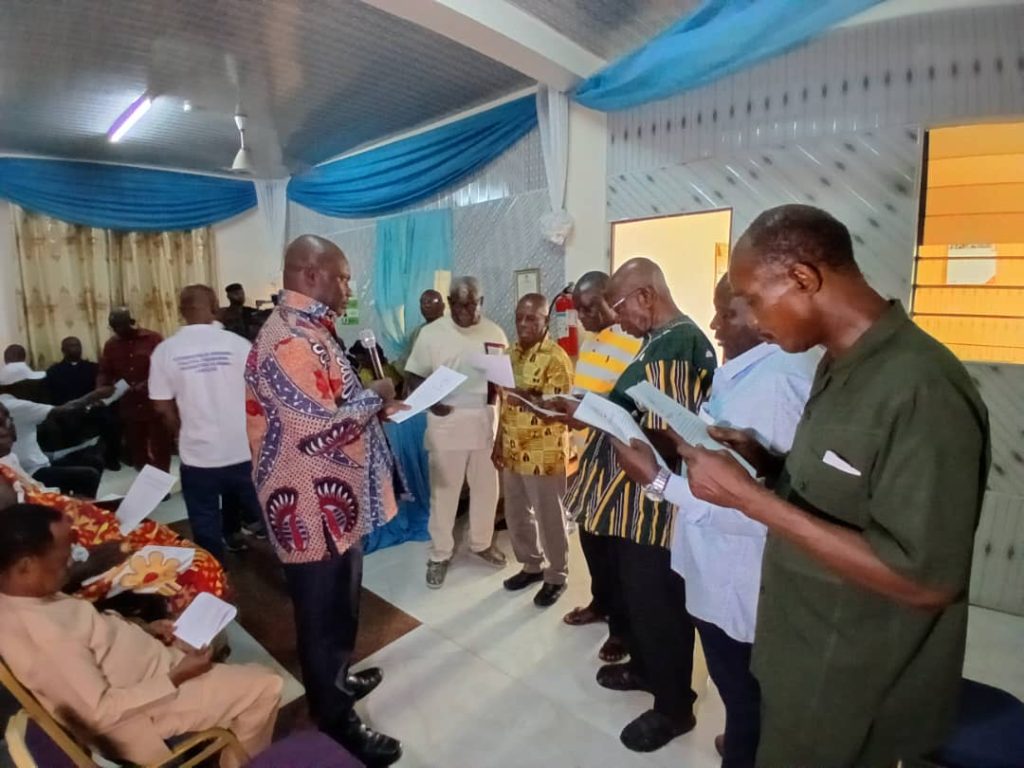By D.I. Laary
Koforidua, Feb. 27, GNA – The Association of Building and Civil Engineering Contractors of Ghana (ABCECG) has appealed to the government to prioritize the payment of local contractors to help address challenges faced by local contractors.
According to the Association, delayed payments for completed projects are placing a massive burden on members, preventing them from securing new contracts or meeting their personal needs.
Rev. Charles Atta Marfo, the newly elected Eastern Regional Chairperson of ABCECG, was speaking with the Ghana News Agency on Wednesday during the inauguration of the eastern regional chairperson and executives for a three-year term.
He emphasized that local contractors were the key to alleviating the growing unemployment situation and urged the government to support contractors to deliver quality services and to be able to provide employment opportunities for young people.
Rev. Marfo indicated that the association has identified several challenges faced by local contractors, including delayed payments, lack of licenses, and inadequate training.
Many contractors are unable to operate due to a lack of certification, which has led to the prevalence of shoddy work in the industry.
“Local contractors are suffering due to the burdens of unpaid completed work,” Rev. Marfo said. “This financial strain not only hampers our ability to take on new contracts but also impacts our personal responsibilities, including health care and our children’s education.”
He elaborated on the dire situation many contractors find themselves in, with some forced to sell their homes to settle overdue bank loans that have accrued substantial interest.
“Others have even fled due to their inability to meet their financial obligations,” he added.

Rev. Marfo called on the government to extend support to local contractors. “We hold the keys to mitigating the significantly growing unemployment crisis,” he emphasised, urging for government intervention to empower local contractors to deliver quality services and provide employment opportunities for youth.
He also emphasized the need for all contractors to come together under the ABCECG umbrella to form a formidable, united front, to form a “strong force” capable of competing for contracts effectively.
“Our aim is to have one strong voice to advance the construction and engineering industry while spurring economic development,” he said.
He highlighted the current fragment within the contractor community in Ghana, noting that many contractors operate without necessary certifications or licenses.
“This lack of regulation contributes to the prevalence of substandard work,” he noted, emphasizing the need for government regulations to ensure that contracts are only awarded to properly vetted contractors.
Rev. Marfo suggested that all contractors must first be assessed for a valid license and certification before being awarded contracts.
“This will enhance the monitoring of work being done and ensure compliance with professional standards,” he explained.
He mentioned that ABCECG continued to be dedicated to assisting its members through ongoing education and regulatory adherence, and that it had a discipline committee in place to handle cases of subpar work, thus promoting accountability among its members.
“We provide regular training and refresher courses on emerging technologies and standards,” he said. “Those registered with our association can be easily traced in cases of substandard work, ensuring accountability and high-quality deliveries.”
He pointed out that the association has a disciplinary committee to address any reports of shoddy work, saying: “Disciplinary committee is in place and actions are usually taken against those who fail to meet industry and professional standards.”
Rev. Marfo appealed to the government to prioritize payments to local contractors, who often commence projects without any mobilization funds.
“We are forced to take out loans with high interest rates, and despite completing projects, payments can take three to five years,” he stated, highlighting that while inflation rises, payments remain stagnant, aggravating debt for many contractors.
Adding her perspective, Ms. Rita Akosua Awatey, the Eastern Regional Minister, implored the new executives to diligently improve the quality of work amongst contractors.
She noted that the Ghanaian public expected nothing less than quality delivery of service from them.
The Association of Building and Civil Engineering Contractors of Ghana aims to be recognized as the premier construction association in the country by enhancing the skills and capabilities of its members while fostering an improved local construction environment.
GNA